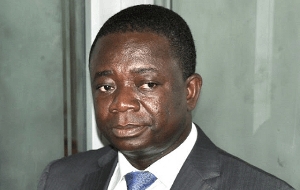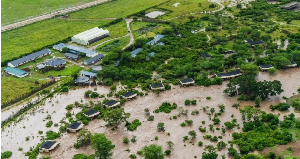- Home - News
- TWI News | TV
- Polls
- Year In Review
- News Archive
- Crime & Punishment
- Politics
- Regional
- Editorial
- Health
- Ghanaians Abroad
- Tabloid
- Africa
- Religion
- Election 2020
- Coronavirus
- News Videos | TV
- Photo Archives
- News Headlines
- Press Release
General News of Monday, 18 August 2008
Source: GNA
Ghana to host International Conference on Aid Effectiveness
Accra, Aug. 18, GNA - Ghana would on September 2 to 4 host the Third High Level Forum in Accra to review and assess progress in the implementation of the Paris Declaration on Aid Effectiveness. Over 1,000 delegates worldwide are to attend the three-day conference, which would also agree on a new agenda for action, dubbed; Accra Agenda for Action (AAA).
Ms Hamilton Harrison, Convener of NETRIGHT Aid Effectiveness Committee, announced at a press briefing in Accra on Monday. The Paris Declaration was adopted in 2005 to increase the impact of aid in reducing poverty and inequality, increasing growth, building capacity and accelerating achievement of the Millennium Development Goals.
The conference would provide the foremost platform for donors, recipient countries and civil society organizations to review the progress on the declaration since its adoption. Ms Hamilton said the hosting of the conference in Ghana demonstrated that the country was enjoying a strong civil society, and this could yield an investment drive.
She said since Ghana was a highly dependent country on aid for development, its processes and other issues should be a major concern to all and appealed to civil society all stakeholders to develop keen interest in deliberations at the conference.
Touching on outcomes of NETRIGHTS national consultations, Ms Hamilton asked donors to discontinue tying national interests to their aids, in order to improve the impact of international aid in recipient countries.
She said this was undermining efforts to address the needs of the poor and marginalized, which should be core thrust of international aid. Ms Hamilton pointed out that key principles of the declaration should have offered opportunities for the removal of inequalities but weak participatory mechanisms, limited engagement with stakeholders, insufficient capacity and resources were threats in Africa. "This would pose a danger of tuning this new aid system into strictly mechanical administrative and financial procedure involving only technocrats," she added.
It therefore called for the adoption of a democratic, instead of institutional system in the process of aid effectiveness that would include the participation of the broader masses, if real transformational change would occur.
"The absence of other stakeholders strengthens the hands of the donors and weakens the position of the recipient countries during negotiations," she noted.
Ms Hamilton also expressed worry on the declaration's position on mutual accountability, which only demanded accountability from recipient countries and not donors.
She said an independent and credible system should therefore be established to actualize the commitment by all in partnership to account to citizens of both donors and recipient countries. She also indicated the need for transparency in the provision of accurate and appropriate information on donor commitment, including timelines that would allow citizens to intelligently participate in policy decisions on aid.
"Negotiators should be conversant with relevant issues especially those related to gender equality," she added. 18 Aug. 08










